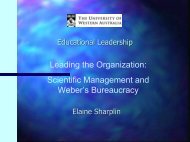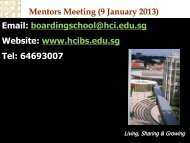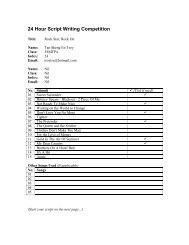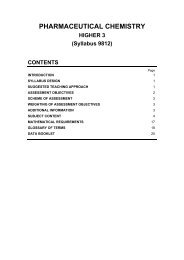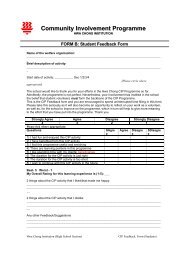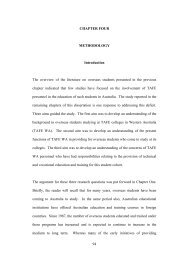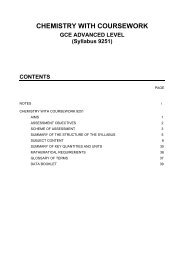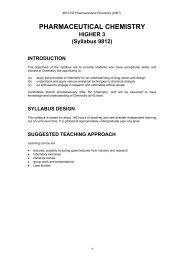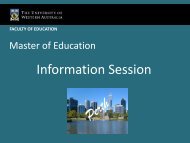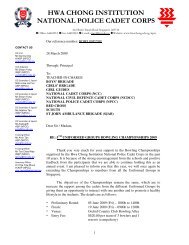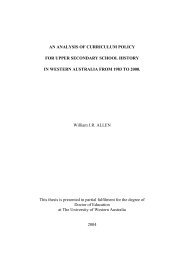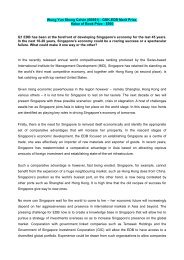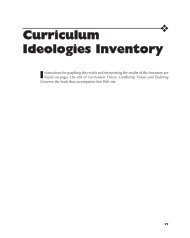EDUC 8678 - Pre-reading - Curriculum and its discontents
EDUC 8678 - Pre-reading - Curriculum and its discontents
EDUC 8678 - Pre-reading - Curriculum and its discontents
Create successful ePaper yourself
Turn your PDF publications into a flip-book with our unique Google optimized e-Paper software.
CURRICULUM AND ITS DISCONTENTS<br />
167<br />
* The Tyler rationale is out-of-date, <strong>and</strong> we have little or nothing to replace<br />
it with.<br />
? Our present ways of thinking <strong>and</strong> talking about schools <strong>and</strong> schooling<br />
do not do justice to the complexity <strong>and</strong> dignity of the human condition.<br />
* The control of the curriculum is in the h<strong>and</strong>s of technologists, test<br />
makers, textbook publishers, <strong>and</strong> school administrators.<br />
* Our schools are losing sight of humanistic values <strong>and</strong> goals.<br />
* <strong>Curriculum</strong> workers have little to offer teachers that is of direct help to<br />
them.<br />
* The aesthetic, ethical, <strong>and</strong> spiritual dimensions of the educational experience<br />
are being ignored.<br />
? Our schools are damaging to many students, particularly to children of<br />
the poor <strong>and</strong> oppressed minorities.<br />
* The Tyler rationale is out-of-date, etc.<br />
Doubtlessly, there are other lines that should be inserted, <strong>and</strong> I may not<br />
have gotten the words exactly right in the ones I have given, but the sense is<br />
there. Furthermore, though no single contributor to the writings from<br />
which I have culled the above list would be likely to nod in agreement to<br />
the total set of assertions, I would bet that the majority of the Discontents<br />
would go along with most of them. In fact, there may be no one who could<br />
not find something, perhaps even a great deal, to agree with on that list,<br />
which may not mean that the list <strong>its</strong>elf is defective as a portrayal of the<br />
complaints to be found in the curricular writings I have studied, but that<br />
there is a bit of discontent in us all.<br />
Our probable agreement with some of the items on the list also means<br />
that the total set of complaints cannot be discarded as crank letters. In fact, I<br />
fear that my flippant use of the liturgical imagery may already have created<br />
the impression that I believe these complaints are not to be taken seriously.<br />
If so, I must hasten to correct it, for my wisecrack about the complaints<br />
forming a litany was merely a crude attempt to inject a note of levity in a<br />
topic that might otherwise become intolerably grave. In truth, I see most of<br />
the items pointing to serious problems that are worthy of our genuine<br />
concern.<br />
Because these individual problems are too numerous to treat in a single<br />
essay <strong>and</strong> the proposed solutions put forth in the writings in question are<br />
even more so, I shall now concentrate on what I perceive to be the two most<br />
general suggestions for change emanating from the Discontents. The first<br />
has to do with a proposed shift in scholarly allegiances from one<br />
intellectual tradition to one or more others. The second has to do with a<br />
proposed change in the relationship between those who talk <strong>and</strong> write<br />
about curricular matters <strong>and</strong> those who are closer to educational practice,<br />
including, especially among the latter, classroom teachers. After describing<br />
each of these sets of suggestions more fully, I will close with a few<br />
caveats of my own.



